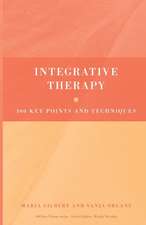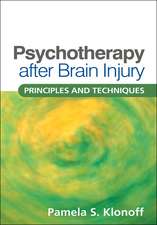Elements of the Helping Process: A Guide for Clinicians
Autor Raymond Foxen Limba Engleză Paperback – 9 mai 2013
- the advent and influence of neuroscience, genetics, and epigenetics and their implications for differential interventions
- the pivotal place of self-awareness, introspection, and reflection in providing treatment
- the intersection of science and art, evidence-based practice, and experiential wisdom in advancing effective therapy
- the infusion and provision of hope, especially in calamitous situations
- personality type
| Toate formatele și edițiile | Preț | Express |
|---|---|---|
| Paperback (1) | 465.49 lei 43-57 zile | |
| Taylor & Francis – 9 mai 2013 | 465.49 lei 43-57 zile | |
| Hardback (1) | 1102.15 lei 43-57 zile | |
| Taylor & Francis – 31 mai 2013 | 1102.15 lei 43-57 zile |
Preț: 465.49 lei
Preț vechi: 489.98 lei
-5% Nou
Puncte Express: 698
Preț estimativ în valută:
89.10€ • 96.81$ • 74.89£
89.10€ • 96.81$ • 74.89£
Carte tipărită la comandă
Livrare economică 21 aprilie-05 mai
Preluare comenzi: 021 569.72.76
Specificații
ISBN-13: 9780415808811
ISBN-10: 0415808812
Pagini: 352
Dimensiuni: 152 x 229 x 20 mm
Greutate: 0.48 kg
Ediția:Revizuită
Editura: Taylor & Francis
Colecția Routledge
Locul publicării:Oxford, United Kingdom
ISBN-10: 0415808812
Pagini: 352
Dimensiuni: 152 x 229 x 20 mm
Greutate: 0.48 kg
Ediția:Revizuită
Editura: Taylor & Francis
Colecția Routledge
Locul publicării:Oxford, United Kingdom
Public țintă
Professional Practice & DevelopmentCuprins
To Do Our Work. Creating a "Safehouse." The Helping Relationship. When You Begin, Begin at the Beginning. Contracting through Goal Setting. Neuroscience, Genetics, and Brain Chemistry. Evaluating Client and Clinician Progress. Assessment: Learning from a Jigsaw Puzzle. Personality Styles. Resiliency: "Who Says I Can’t." On Reflection and Self-Awareness. Models of Helping: Working with an Individual. Models of Helping: Working with a Family. Clients Recommend Effective Ways to Treat Trauma. Advances in Working with Complex Trauma. Creative Ways of Capturing the Life Story. The Written Word: Enriching Your Work. Metaphors in Our Losses. The Termination Process. Epilogue.
Notă biografică
Raymond Fox, PhD, LCSW, is a Professor in the Graduate School of Social Service at Fordham University, USA. He also maintains a private practice as a certified individual, marital, family, sex, and group psychotherapist.
Recenzii
"Once again, Ray Fox provides an excellent text for students and clinicians who desire practical guidelines, systematic direction, and creative suggestions for working with clients in therapy. Acknowledging the centrality of relationship, reflection, and practice wisdom in providing therapy that is humane and less technocratic, Dr. Fox provides useful case examples to explicate the concepts that are presented." - Carolyn Bradley, PhD, LCSW, Associate Professor of Social Work, Monmouth University
"Raymond Fox has an exceptional ability to create connection with his readers. In this latest edition of Elements of the Helping Process, he demonstrates once again the capacity to integrate the diverse aspects of helping into a coherent, integrated, and accessible whole. This book should be a part of every practitioner's library, a source to go back to again and again." - Clay Graybeal, PhD, Associate Dean for Academic Affairs, Westbrook College of Health Professions, University of New England
"Raymond Fox has an exceptional ability to create connection with his readers. In this latest edition of Elements of the Helping Process, he demonstrates once again the capacity to integrate the diverse aspects of helping into a coherent, integrated, and accessible whole. This book should be a part of every practitioner's library, a source to go back to again and again." - Clay Graybeal, PhD, Associate Dean for Academic Affairs, Westbrook College of Health Professions, University of New England
Descriere
The book takes a humanistic approach to guiding clinicians, emphasizing that professional practice involves a deliberate, conscious, and disciplined use of self with clients’ participating in a forum that is steady, safe and consistent. The overall message is for clinicians, anchored in discipline, art and compassion, to establish with their clients an ambiance of openness, challenge, and change.









